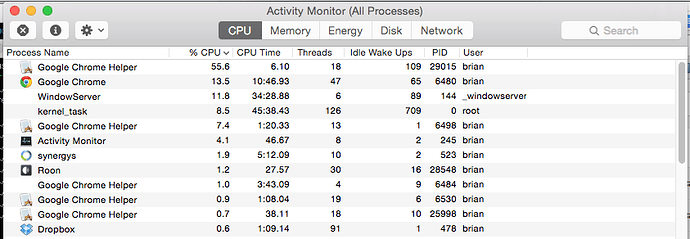We’re not out to ridicule anyone. There is definitely a place for subjective observations when evaluating audio playback systems–virtually all well-respected audio manufacturers engage in subjective testing as part of their product development process.
Roon is still passing its bit-perfect tests–so this isn’t that sort of problem as long as you’re seeing the purple signal path light. That leaves us with the analog domain.
Before we go there, keep in mind that Roon does a lot of things that many other apps do not, including but not limited to:
- Painting a pretty, GPU-accelerated user interface
- Background analysis of audio files
- Background processing of metadata updates
- Background syncing with TIDAL
- Scanning for changed media files
- Acting as a server for other control points in your house
All of these things can make your computer work harder than it might otherwise, and if your system is built in such a way that analog-domain noise from your computer has a meaningful impact on your analog audio gear, it is possible for just about anything going on inside of the computer to have an impact on SQ.
If you’re going to make a serious evaluation of analog-domain behavior, it’s necessary to control for what every other app on the machine might be doing, as well as your operating system. And, for that matter, what other people in your house sharing the same circuit as your gear are doing at the time. And I hope that none of the other software on your machine has taken an update recently!
Right when Roon starts up, it does a full sync of your TIDAL library (if logged in), and a full walk of all of your storage devices looking for new/deleted/changed files. Depending on your storage configuration, this can take quite a while.
Even the exact state of the UI can make a difference in your CPU/GPU workload: if the seekbar at the bottom is ticking, the screen is painting the screen ~1x/second. If the nowplaying indicator on an album details screen is animating, it’s painting ~15x/second. If the spinner at top right is spinning, it’s painting ~20x/second.
Regardless, background work, or having a nice user interface, aren’t bugs. It’s just part of what makes Roon Roon. We can’t provide the user experience that we provide without that stuff.
This is part of why we’ve developed RAAT and the RoonReady program–it removes the conflict inherent in juxtaposing “powerful media server that runs on a fast noisy PC” and “analog circuitry critical to sound quality”. I guarantee that we wouldn’t be having this conversation if your audio was flowing through an Auralic Aries or Meridian 808.3 two rooms away from the server. Those devices, unlike your computer, are carefully designed and measured to ensure impeccable analog-domain behavior.
There’s nothing wrong inherently inconclusive about subjective listening tests if they are done in a statistically sound way–blind ABX testing, preferably with at least a small population of listeners. Personally I don’t even trust my own subjective observations if made outside of a structured and controlled test environment. These testing methodologies are sound, and were developed for a good reason.
This is difficult stuff, and a touchy subject for many. We’re happy to help in any way that we can–but there is simply no practical way that we can fix a problem that’s described in terms of how “analog” Roon sounds. We need something more concrete to investigate.




